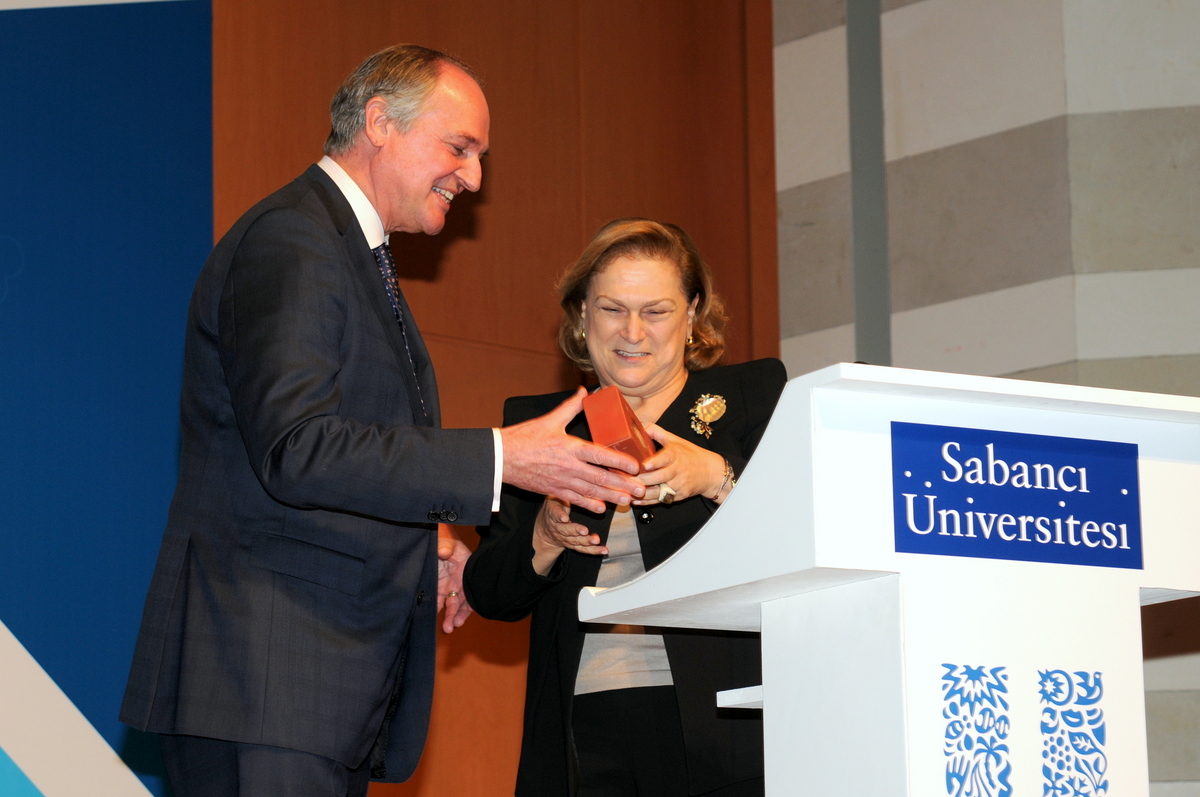07/11/2013
Sabancı University hosts Unilever President Paul Polman
“Today is the best day to start building a better world!”
Bringing the global world of business to its students with more than 700 conferences every year, Sabancı University hosted a lecture by Paul Polman, President and CEO of Unilever, one of the world’s largest fast-moving consumer goods companies. Paul Polman gave a lecture titled “Creating a Better Future Everyday Made By You.”

The lecture was hosted by Sabancı University Board of Trustees Chair Güler Sabancı, President Professor Nihat Berker and School of Management Dean Professor Füsun Ülengin.
In her introductory remarks to almost 1000 university students, Professor Füsun Ülengin said that the growing interest in sustainable growth pleased everyone. Ülengin noted that sustainability had become a strategic priority for the private sector in recent years, and that Unilever was a global leader in innovation for sustainability.
Füsun Ülengin said that by embracing a similar vision, Sabancı University topped the “University Innovation and Entrepreneurship Index” created by the Turkish Ministry of Science, Industry and Technology for the first time in 2012. Ülengin noted that Sabancı University specifically invites global leaders on sustainability, informing the audience that Sabancı University is the first university signatory of the UN Global Compact in Turkey, that its MBA and Executive MBA are ranked in FT lists, and that the School of Management is a signatory of Principles for Responsible Management Education (PRME). Ülengin also noted that the Corporate Governance Forum under the School of Management implements the Turkish leg of the Carbon Disclosure Project and the Independent Female Directors Project. Füsun Ülengin concluded her remarks by saying that the objective of Sabancı University was to contribute to the creation of the future and develop leaders for the future.
Taking the floor, Paul Polman said, “Interdependent financial structures, emerging technologies and economic systems make management in a global world more complex. A fast-changing, irresolute, complex and obscure future awaits us. It is clear that the balance of the world has been disrupted, and we must all take the responsibility to work towards changing the world.”
Polman stressed the need to transition to a more fair and sustainable mode of capitalism in the light of the consequences of rapid globalization, and said that the secret to successful growth laid therein.
“The social and environmental issues we face are harder than ever. Population is booming, the climate is changing at an increasing pace, and water resources are dwindling. While one billion people suffer from hunger, another 1 billion people live in plenty, and over 1 billion children die every year of intestinal diseases” said Polman, and called for the youth to support sustainable life:
“Improving the current situation is our responsibility as today’s leaders, whether in business, government or civil society, and this responsibility will be yours in the future as the next generation of leaders. Today is the best day to start building a better world. This is our duty and our responsibility.”
Sustainability is a business model that can both be profitable and have positive impact on nature and humanity
Explaining that Unilever strives to lead global change, Paul Polman continued, “However, this is not something that we can manage alone. This is why collaboration with NGOs, governments, businesses and universities is of great importance to us.”
Polman said: “At Unilever, our corporate objective is to grow our business by a factor of two while halving our environmental footprint and increasing our positive social impact. Our Sustainable Life Plan helped us to grow our business by 30% in the past 4 years while reducing energy and water consumption and waste. Our health and hygiene campaigns touched the lives of a quarter of a billion people. We now obtain one-third of our raw materials from sustainable sources. We enabled 450.000 small-scale farmers to receive training in sustainable agriculture. We have thus proven that sustainability is a winning business model that pays dividends to both the environment and humanity.”
Video:




